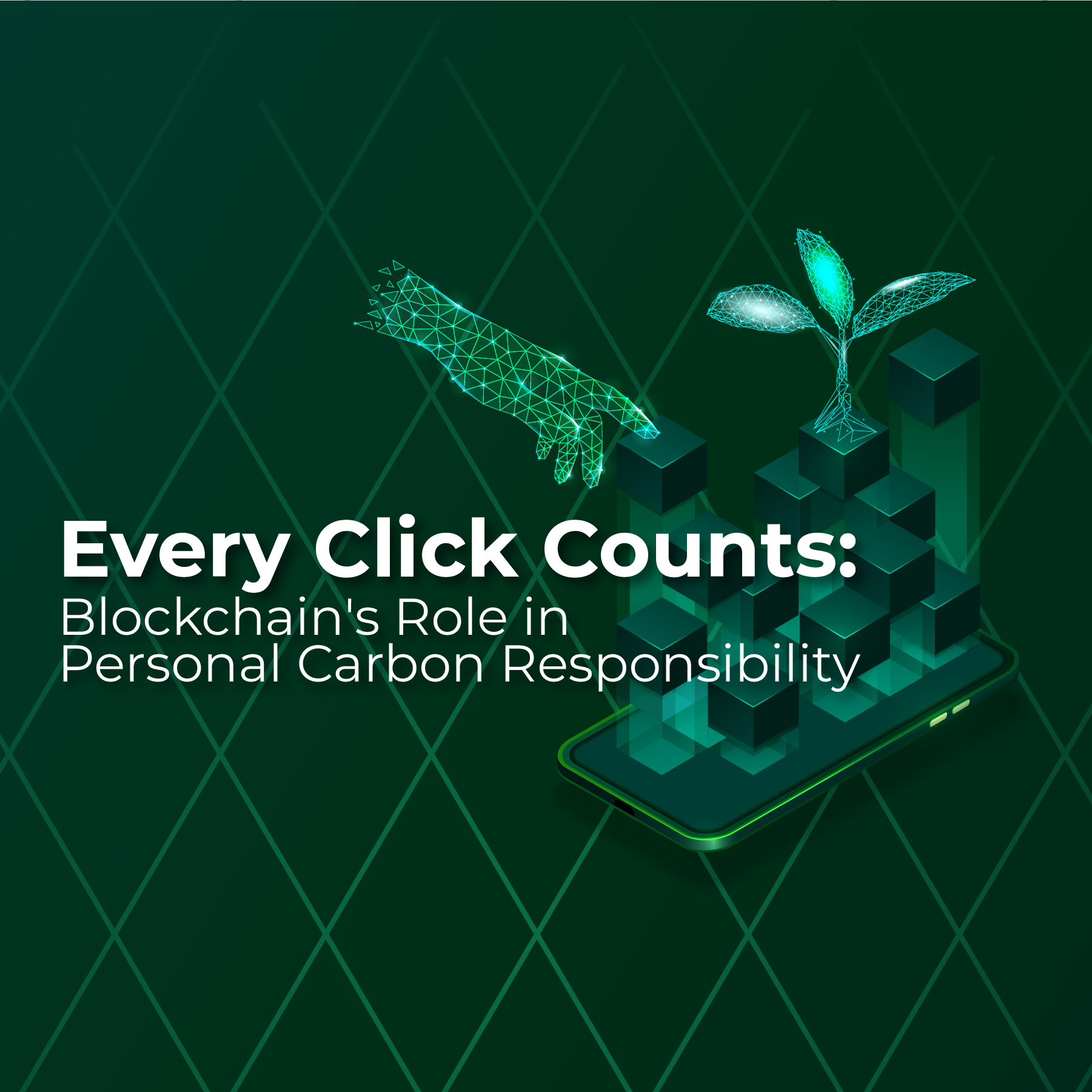Imagine if you could help the environment with just a few clicks…
Yes, clicks because our digital lives have become a huge part of our daily routine for a while now.
Just imagine that with such a small effort, you can plant a tree on the other side of the world. Help someone put food on their table and feed their kids. Grow agroforestry systems that enrich local biodiversity.
Well, fortunately, this is no longer something imaginary.
This already exists and is very much real.
And that’s all because…
Blockchain makes compensating for your CO2 footprint quick and easy
Welcome to the era of blockchain carbon compensation – a groundbreaking invention that lets every single one of us minimize our impact on the planet.
Blockchain gives everyone with an internet connection access to the carbon market. Something that was infamously hard and tedious before carbon tokens became a thing. Not to mention all the other problems of the old carbon market. It also brings carbon offsetting into digital spaces like games, making it even more engaging and accessible.
Compensating on-chain allows you to make up for your emissions almost in real time. This is because most blockchains, like Polygon, now use Proof-of-Stake, which allows them to do fast transactions with a minuscule impact on the environment.

On top of the speed and convenience, compensating on blockchain also leaves a permanent trace, making it very easy to verify.
So what’s the big deal?
Everyone now gets access to something that used to be available only to a few, with a mountain of red tape surrounding it.
Oh, and there’s also the thing where you and I get the chance to help the planet.
You know, our one and (for the time being) only home.
But until we start taking round trips to Mars, we might as well care for the Blue planet.
And that starts with making compensating for our activities quick and easy for everyone.
This is crucial because it allows more people to participate in fighting climate change. Simple, accessible methods encourage everyone – not just big companies, to reduce their carbon footprint. This widespread involvement is key to making a real impact on global emissions, helping us move faster towards a more sustainable future. Easy-to-use tools that fit conveniently in our busy lives, make environmental responsibility – even for everyday things, practical.
My carbon footprint, your carbon footprint
When we consider the impact of our daily activities, it’s eye-opening to see how each choice we make, even the small ones, contributes to our overall footprint.

For example, the environmental impact of a quick Google search or sending a text message is minimal but very much real. Googling and texting can emit as much as 360 million tonnes of CO2 per year.
Similarly, wearing a favorite pair of jeans comes with a carbon cost of 415 kg of CO2. That’s 915 pounds for all of you from the other side of the pond.
And even choices like our diet – whether we prefer a meat-based or a vegetarian diet, impact our footprint when we decide to go somewhere. This is true even if you use ecological ways of transportation like walking or riding a bike.
Cycling itself doesn’t produce much CO2, only about 21 grams per kilometer, which is less than walking, taking the bus, and a lot less than driving a car.

However, the type of food someone eats can change these numbers. For example, a diet with a lot of meat can produce up to 1500 g of CO2 for every 100 calories. This is very different from a vegetarian diet, which is better for the environment and creates much less CO2.
Also, consider this: a large latte can produce more than 500g of CO2.
Are all these numbers making you dizzy?
Wait there’s more!
Since the ski season is approaching you may decide to fly off on a winter holiday.

Let’s say you picked Geneva as your destination.
A commonly used figure in environmental impact studies and analyses related to air travel is 90 grams of CO2 per passenger kilometer.
This value is a general approximation and can vary depending on the specific type of aircraft, its efficiency, and other factors.
For the sake of simplicity, we’ll just use it in our calculations:
Amsterdam to Geneva (688 km one way):
- Round trip: 688 km × 2 = 1376 km
- CO2 emissions: 1376 km × 90 g/km = 123,840 g = 123.84 kg
Berlin to Geneva (876 km one way):
- Round trip: 876 km × 2 = 1752 km
- CO2 emissions: 1752 km × 90 g/km = 157,680 g = 157.68 kg
Paris to Geneva (411 km one way):
- Round trip: 411 km × 2 = 822 km
- CO2 emissions: 822 km × 90 g/km = 73,980 g = 73.98 kg
By now, you already know that generating a CO2 footprint is unavoidable.
But by all means, we’ve listed these examples not as a way to frighten you.
Understanding them isn’t about feeling overwhelmed or guilty. Rather, it’s about recognizing the power we all have to make a difference. Each of these actions, while contributing to our carbon footprint, also offers an opportunity for us to be more aware. By realizing the weight of our choices and actions, we can take steps to deal with their negative impact.
Whether that’s choosing a more sustainable lifestyle or directly offsetting emissions through solutions like carbon tokens, every small action adds up to a significant positive change.
Going carbon neutral, one token at a time
If you’re keenly aware of your environmental impact and want to do something about it, now you have the perfect tool at your disposal:
Carbify’s $aCO2 carbon debit token allows you to compensate on the spot. For whatever reason. And unlike many places where you can compensate, the money goes back to the environment – planting new trees and agroforestry systems.
The $aCO2 token uses all the advantages of blockchain compensation – transparency, speed, and accessibility. With it, everyone with a device and a connection can offset their emissions.
But you might be thinking “Hold up, aren’t big businesses responsible for a lot of CO2 emissions?”
Yes, that’s definitely true. But it doesn’t change the fact that the steps we take to reduce our own carbon footprint, really matter. When we all do our part, like planting trees, using less electricity, riding bikes instead of driving, or compensating for our emissions, it all adds up and makes a big difference. Our individual actions can also inspire others to join in, creating a chain reaction of positive change. This is important because it shows that people care about the environment, which can encourage leaders and big companies to focus more on protecting it.
So, every little bit we do to help the environment counts, and together, all of these small actions can lead to big changes.
Carbify Greenpaper: https://docs.carbify.io/
Carbify Website: https://www.carbify.io
Carbify Discord: https://discord.gg/carbify
Carbify Telegram: https://t.me/carbify
Carbify Twitter: https://twitter.com/Carbify_io
https://www.unschooled.nl/william-ten-zijthoff-carbify
























